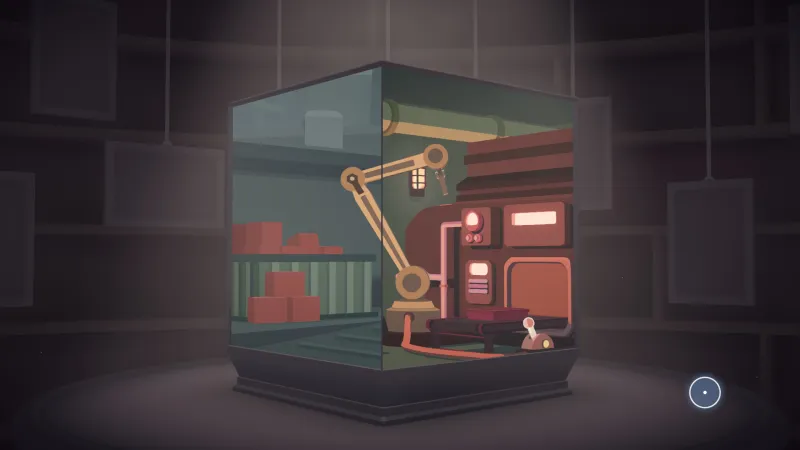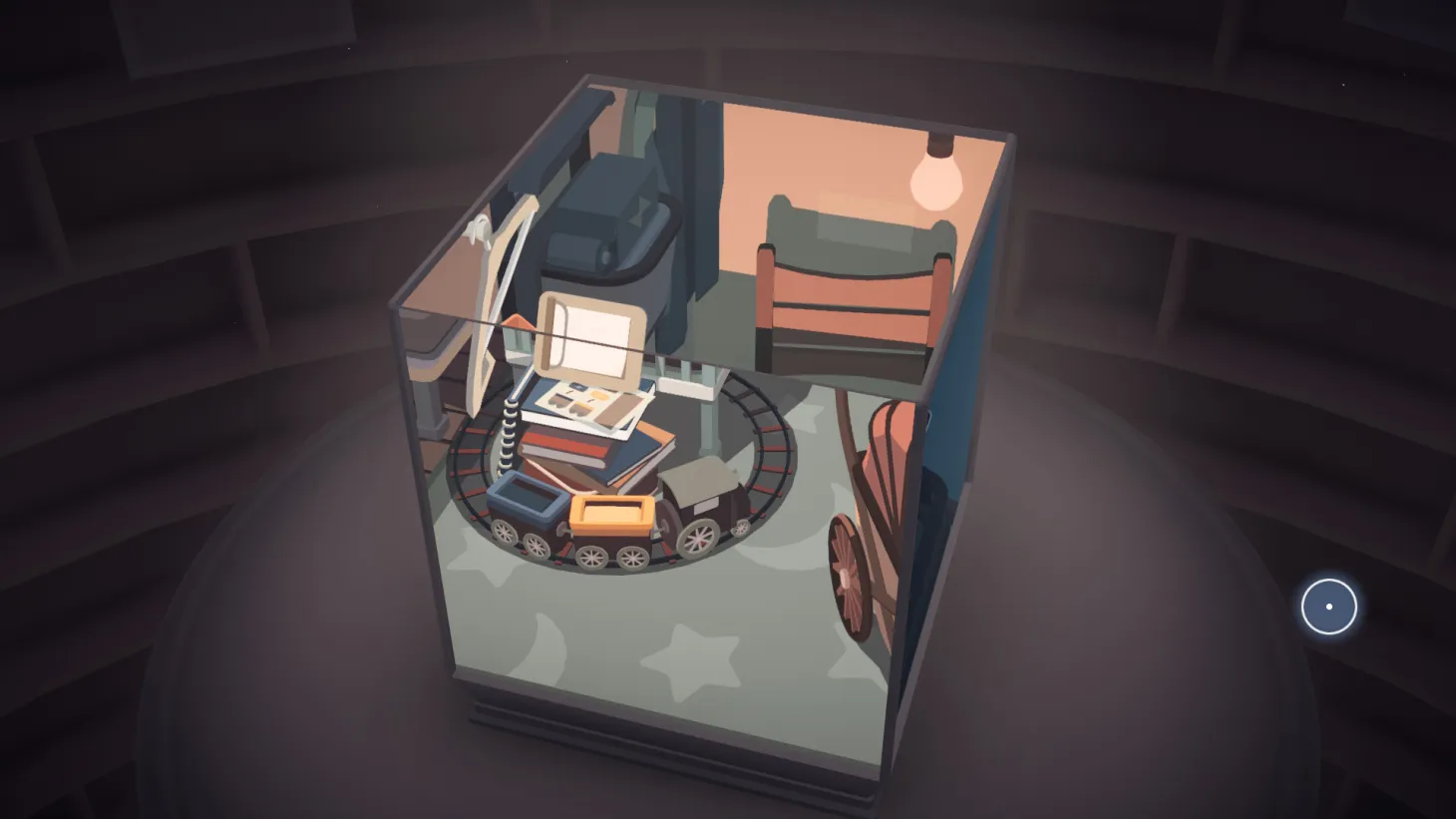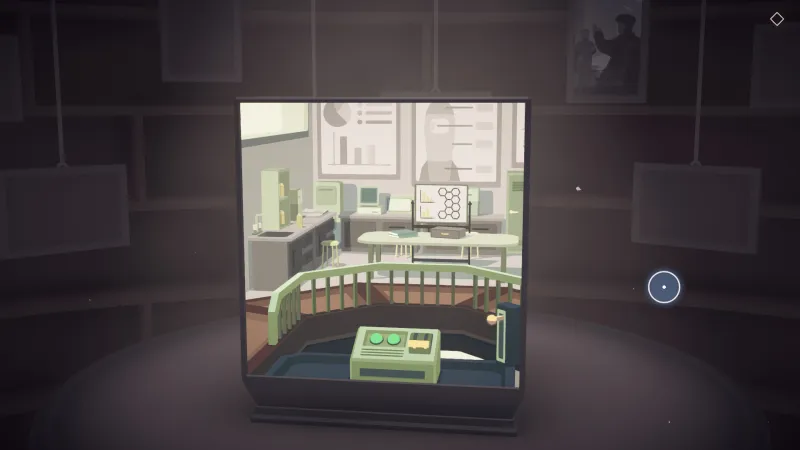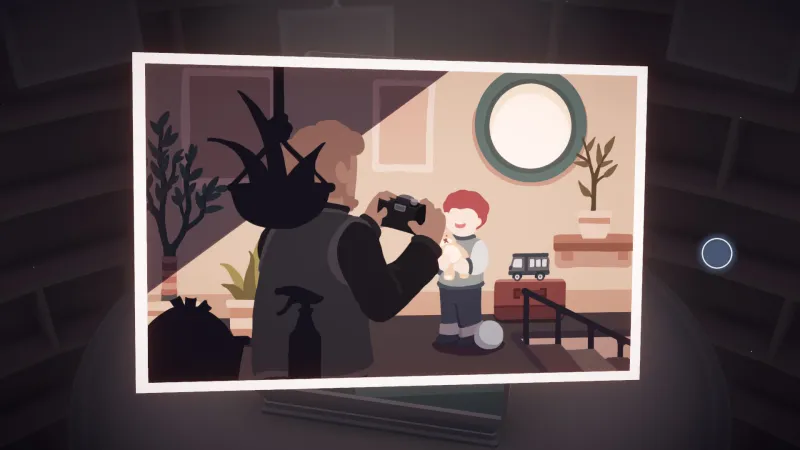


In a dim, empty room, on a small table, lies a cube. Moncage dumps players right into the action with a few quick notes on how to manipulate this multi-faceted object. It tasks you with connecting similar objects found on the box’s different planes by spinning the cube and looking at things from unique perspectives. At first, the challenge seems simple. However, as the game progresses, puzzles grow more sophisticated, and the seemingly unconnected scenes reflected on the cube’s sides begin to weave into a narrative. I only wish that narrative had more substance.
Each side of Moncage’s six-sided cube displays a distinct vignette – like a window into various environments. Objects in one scene align with objects from another if the player rotates the cube to the right perspective. My first goal in Moncage is to open a suitcase displayed on one side. Inside is a teddy bear, toy truck, and various child’s playthings. The minimalistic aesthetic presents the shape of each object, but not the fine details, which sets a dreamlike tone that compliments the surreal gameplay. The simplistic appearance is also crucial in allowing the optical illusions players need to piece things together and progress through the experience.

With nothing left to do in the first panel, I rotate the box to the left, finding a broken dump truck stalled in front of a factory. Since the trucks in both panels have the same coloring and lines, I twist the cube so that the front half of the child’s toy in the first scene lines up with the vehicle’s back half on the other side of the cube. That does the trick, and the newly fixed truck moves down the road.
Even though this initial solution isn’t difficult, it leaves me feeling accomplished. Moncage replicates this feeling over and over again in new and imaginative ways, making it a really rewarding puzzle game. For instance, in my favorite section, I have to move from one side of the cube to the next, quickly matching up bits of benches, water containers, tanks, and more into a Rube Goldberg machine to allow a tiny object to roll through every vignette without stopping. Stringing this all together and getting the timing correct was gratifying in a vein similar to beating a giant boss from an action game.

However, some answers are not apparent. Like many puzzle games, overlooking some small detail occasionally left me beating my head against the wall. For example, in one level, I could tell a radio antenna fit perfectly with an electrical post, but I didn’t realize for some time that I had to light up one scene for the objects to be the same color before they could match up. Thankfully, there's a creative, effective, and robust hint system. At any point during the game, you can hit a button to make important objects glow. The guidance is subtle and feels more like a nudge in the right direction than a direct line to the solution. If that isn’t enough, the next hints offer written clues, and once you burn through those, the game offers a short video clip showing the puzzle’s solution. This was very helpful in situations where I had the right idea but wasn't precise enough to register the solution. I find this hint system really appealing. It effectively combats the frustrations of typical puzzle games but doesn’t make asking for help feel like defeat.

As I make my way through the game, I find that what had, at first, seemed like random, unrelated tableaus, were actually bits and pieces taken from a bigger, overarching story. Typically, this kind of storytelling fascinates me, but Moncage’s narrative didn’t capture my attention. Overall, the story is too nebulous to be impactful. It doesn't help that much of the narrative is told through photographs carefully hidden throughout the game, meaning players can easily miss significant plot elements. There are undoubtedly evocative moments – several pictures are dedicated to the subject’s wartime experiences, both good and bad. One image, for example, captures a fun outing to the fair seemingly marred by the veteran’s traumatic reaction to fireworks. There are also some interesting moments when the pictures allow me to understand something new about a location I visited as part of an earlier puzzle, especially at the end. However, I walked away from the game wishing I knew a little more about the underlining story and didn’t have to piece together the ambiguous events myself.
Moncage is an intelligent puzzle game, and its perspective-based riddles stretched my imagination as each scene flowed beautifully into the next. The narrative could have hit harder, and it sometimes felt like I had to align things perfectly for the game to accept the correct answer, but Optillusion’s title is a challenge worth picking up.